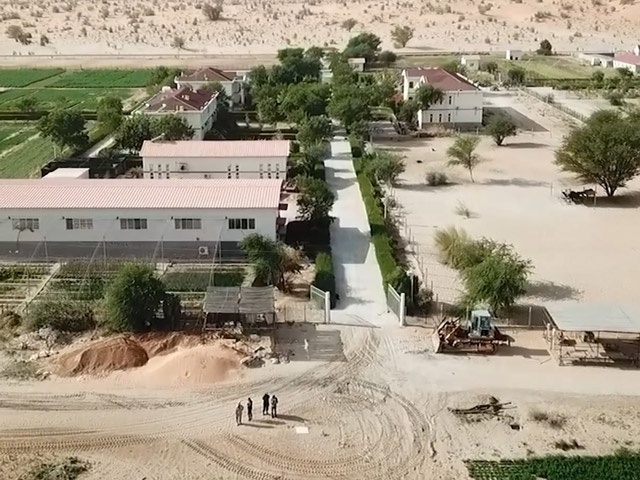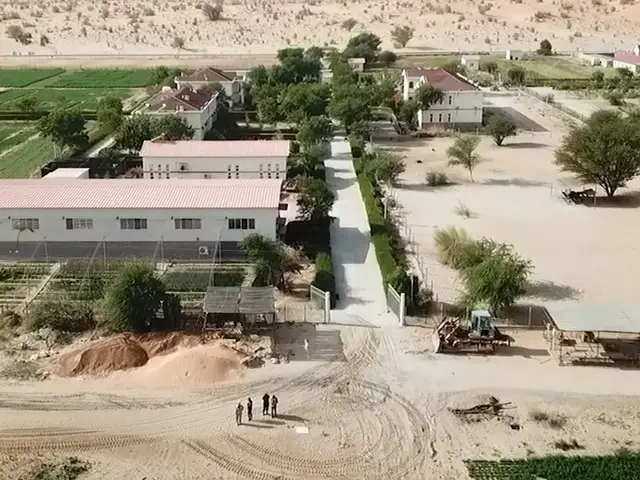By Huang Peizhao, People's Daily

Photo shows an animal husbandry technology demonstration center aided by China in Mauritania. (Photo courtesy of the demonstration center)
"Thanks to the 'king of forages' from China, livestock now have enough food to eat and the environment is getting better," said Abdu, a herdsman from Al-Idiny, a village 60 kilometers away from Nouakchott, the capital of Mauritania.
Lying in the outer peripheral area of the Sahara Desert, Al-Idiny was once a barren piece of land covered by sands, Abdu told People's Daily.
The "king of pastures" he said is Medicago sativa, also known as lucerne. It was introduced to the African country by Chinese animal husbandry experts. As an herbaceous plant in the legume family Fabaceae, lucerne is excellent for fattening livestock.
According to local customs, when a man asks for permission to marry a woman from the woman's family, he has to send at least 10 sheep to the family as a betrothal gift.
Abdu told People's Daily that he only kept five sheep in the past, and three of them died because there was not enough forage. The remaining two were skin and bones, he said.
It was the arrival of Chinese experts that promoted the progress of local animal husbandry. "Now I keep 10 sheep and all of them are fat. I'll be able to get married soon. I appreciate the assistance from our Chinese friends," Abdu noted.
Animal husbandry is one of the pillar industries in Mauritania. However, over 80 percent of the country's land is covered by sands and the dry season there spans as long as nine months. Rainfall is scarce and meadows are becoming deserts. Many people in Al-Idiny, including Abdu, once believed that it was impossible to grow plants in the desert.
In 2016, an animal husbandry technology demonstration center aided by China started trial operation in the African country. Chinese experts improved local soil by employing water-saving irrigation methods and organic fertilizers. Finally, the first batch of lucerne was grown in April 2017. The plant has an average growth period of a month, and every mu (about 667 square meters) of land can produce over two tons of dried lucerne on an annual basis.
Today, Al-Idiny is home to nearly 1,000 mu of lucerne. The plant, striking a balance between forage and livestock, has made the village a big name for poverty alleviation. It is often visited by officials and herdsmen from other regions, hoping to learn about lucerne-growing techniques.
Abdu said in 2018, then Mauritanian President Mohamed Ould Abdel Aziz had an inspection tour to Al-Idiny. Seeing the prospering lucerne, Aziz couldn't believe that the plant was actually growing in the desert, Abdu recalled.
"I'm grateful to Chinese experts who have brought us the 'king of forages.' The lucerne changed our lives and improved the image of our village," Abdu noted.
Lying in the outer peripheral area of the Sahara Desert, Al-Idiny was once a barren piece of land covered by sands, Abdu told People's Daily.
The "king of pastures" he said is Medicago sativa, also known as lucerne. It was introduced to the African country by Chinese animal husbandry experts. As an herbaceous plant in the legume family Fabaceae, lucerne is excellent for fattening livestock.
According to local customs, when a man asks for permission to marry a woman from the woman's family, he has to send at least 10 sheep to the family as a betrothal gift.
Abdu told People's Daily that he only kept five sheep in the past, and three of them died because there was not enough forage. The remaining two were skin and bones, he said.
It was the arrival of Chinese experts that promoted the progress of local animal husbandry. "Now I keep 10 sheep and all of them are fat. I'll be able to get married soon. I appreciate the assistance from our Chinese friends," Abdu noted.
Animal husbandry is one of the pillar industries in Mauritania. However, over 80 percent of the country's land is covered by sands and the dry season there spans as long as nine months. Rainfall is scarce and meadows are becoming deserts. Many people in Al-Idiny, including Abdu, once believed that it was impossible to grow plants in the desert.
In 2016, an animal husbandry technology demonstration center aided by China started trial operation in the African country. Chinese experts improved local soil by employing water-saving irrigation methods and organic fertilizers. Finally, the first batch of lucerne was grown in April 2017. The plant has an average growth period of a month, and every mu (about 667 square meters) of land can produce over two tons of dried lucerne on an annual basis.
Today, Al-Idiny is home to nearly 1,000 mu of lucerne. The plant, striking a balance between forage and livestock, has made the village a big name for poverty alleviation. It is often visited by officials and herdsmen from other regions, hoping to learn about lucerne-growing techniques.
Abdu said in 2018, then Mauritanian President Mohamed Ould Abdel Aziz had an inspection tour to Al-Idiny. Seeing the prospering lucerne, Aziz couldn't believe that the plant was actually growing in the desert, Abdu recalled.
"I'm grateful to Chinese experts who have brought us the 'king of forages.' The lucerne changed our lives and improved the image of our village," Abdu noted.
 Menu
Menu
 China's "king of forages" paves way to prosperity for Mauritanian herdsmen
China's "king of forages" paves way to prosperity for Mauritanian herdsmen
















